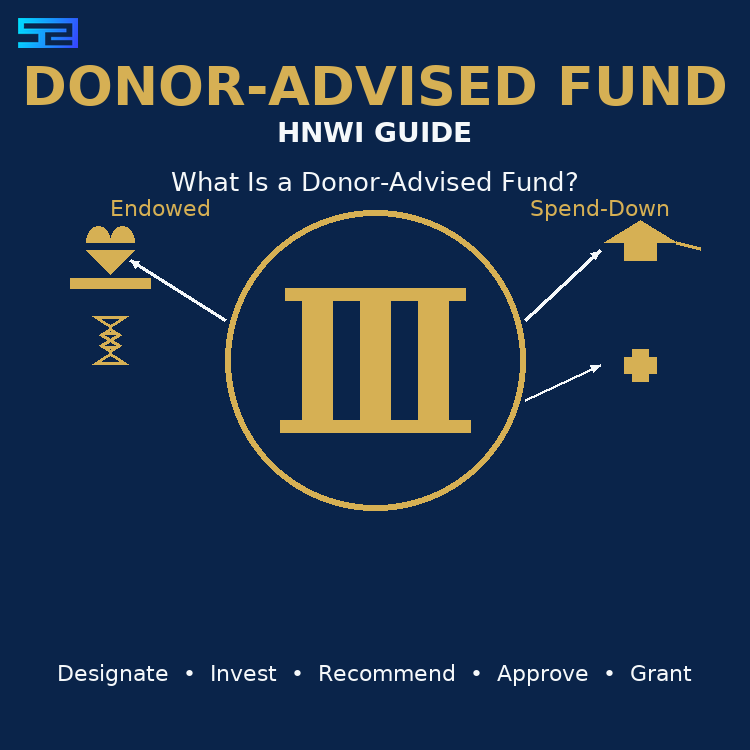Donor-Advised Fund (DAF): A Plain-English Guide for HNWI
TL;DR
A donor-advised fund (DAF) is a charitable account at a public charity where you make an irrevocable contribution, receive a receipt for potential tax deduction (subject to rules), invest the assets for potential growth, and recommend grants to eligible nonprofits over time; the sponsor reviews and approves the grants and handles administration.
Why HNWI Use DAFs
High-income years, concentrated stock, business-sale events, and the desire for simple, private, flexible giving make DAFs compelling. You centralize gifts, separate the tax moment (when you fund the account) from the impact moment (when you grant), and streamline record-keeping. For many families, a DAF becomes the operational hub for multi-year philanthropy without the complexity of a private foundation.
How a Donor-Advised Fund Works
Sponsor & Structure
A DAF lives at a public charity sponsor (e.g., a community foundation or national sponsor). The sponsor owns the assets, administers the account, and issues grant payments to charities after reviewing your recommendations for eligibility.
Funding the Account
You can contribute cash or appreciated securities; many sponsors also accept complex assets (restricted stock, private business interests, real estate) subject to due diligence and policy. The contribution is irrevocable.
Investment Options
Sponsors offer investment pools—index, active, short-term cash, and increasingly impact/ESG options. Larger balances may qualify for advisor-managed portfolios. Asset allocation should reflect your expected grant cadence: near-term grants favor liquidity; longer horizons can justify growth exposure.
Recommending Grants
You recommend grants to qualified charities at any time or on a schedule. The sponsor reviews each recommendation, confirms eligibility, and issues the grant. You can create recurring grants, group grants by theme, or align to a family mission statement.
Advisory Privileges vs. Control
You advise; the sponsor controls approval. You cannot receive incidental or personal benefits from grants (no tickets with benefits, memberships with perks, quid-pro-quo, or grants to individuals).
Tax Planning for HNWI
Deduction Timing & AGI Limits
DAF contributions follow public-charity deduction rules and AGI limits that change periodically. Many HNWI use a DAF to “bunch” several years of giving into a high-income year: fund once, then grant over time.
Appreciated Assets
Gifting long-held appreciated securities can help avoid embedded capital gains while potentially taking a deduction on fair market value (subject to rules). Sponsors differ on what they accept and how they process complex assets—confirm early.
QCDs from IRAs
The IRS says Qualified Charitable Distributions (QCDs) cannot be directed to DAFs. If QCD strategy is central, pair the DAF with designated funds or direct gifts to qualifying public charities.
Substantiation & Valuation
Your sponsor provides written acknowledgment for cash and marketable securities. Non-cash/complex gifts may require qualified appraisals and additional filings—coordinate with your CPA.
Not tax, legal, or investment advice. Rules are nuanced and change. Always consult your CPA/attorney and confirm sponsor policies.
DAF vs. Designated Fund vs. Private Foundation vs. Field-of-Interest
| Feature | Donor-Advised Fund | Designated Fund | Private Foundation | Field-of-Interest |
|---|---|---|---|---|
| Grant Control | Donor recommends, sponsor approves | Fixed to named charity(ies) | Board controls grants & operations | Sponsor grants within a cause area |
| QCD Eligibility | Not eligible | Often eligible (no advisory rights) | Not eligible | Often eligible |
| Setup/Complexity | Low | Low | High | Low |
| Privacy | High | High | Lower (public filings) | High |
| Assets Accepted | Cash, appreciated securities; some complex | Similar; sponsor-dependent | Broad but complex | Similar |
| Best For | Flexible, ongoing giving | Perpetual support to specific orgs | Maximum control & governance | Support a defined cause area |
Bottom line: Choose a DAF when you want flexibility and simplicity; a designated fund when you’ve pre-chosen beneficiaries; a private foundation when governance, staffing, and control matter more than simplicity; a field-of-interest fund when you care about a cause more than naming grantees.
Fees, Investments & Governance
Administrative Fees
Sponsors charge tiered asset-based admin fees (with minimums). Larger balances reduce marginal fees. Review what’s included (grant processing, due diligence, account services).
Investment Costs
You’ll pay the underlying expense ratios of the pools, and, if applicable, advisor fees on advisor-managed options. Evaluate total cost relative to allocation, time horizon, and expected grant pattern.
Risk, Liquidity & Rebalancing
Match allocation to grant cadence. Keep a cash sleeve for near-term grants and re-balance annually. If you plan to grant a large amount in the next 6–12 months, reduce volatility risk accordingly.
Advanced Uses for HNWI & Family Offices
Pre- and Post-Liquidity Events
Pre-IPO or business-sale planning can move highly appreciated assets into the DAF before a taxable event (subject to insider/lockup rules and sponsor policies). After liquidity, use the DAF to structure multi-year giving.
Concentrated Stock & Low-Basis Assets
Use an in-kind gift to the DAF to diversify philanthropic capital without triggering gains inside your personal portfolio, then deploy a rules-based grant plan.
Impact & Mission-Aligned Pools
Many sponsors offer impact/ESG pools. Define what “mission-aligned” means in your IPS—screening, tilts, or thematic exposure—and confirm monitoring/reporting.
International Giving
DAFs typically grant to U.S. public charities. Some sponsors can support cross-border giving via equivalency determinations or intermediary charities. Expect extra diligence and timelines.
Coordinating with Trusts & Estates
DAFs often sit alongside CRTs/CLTs, bequests, and family governance documents. Use a donor statement of intent to guide successors on mission, themes, and cadence.
Succession & Legacy
- Successor Advisors. Name children or trustees to continue recommendations.
- Split-into-Legacy DAFs. Divide into multiple DAFs for heirs with distinct missions.
- Convertibility. Some families later convert residual balances to designated funds or field-of-interest structures for perpetual support without ongoing advisory work.
- Family Governance. Annual “grant summit,” decision criteria, and impact reporting sustain engagement across generations.
Decision Checklist (Is a DAF Right for You?)
- You want flexible giving and centralized records.
- You anticipate high-income years and want deduction timing leverage.
- You plan to contribute appreciated assets or potentially complex gifts.
- You prefer privacy and speed over the governance of a foundation.
- You value simple successor pathways for multi-generation philanthropy.
FAQs
What is a donor-advised fund?
A charitable account at a public charity where you contribute irrevocably, may invest for potential growth, and recommend grants to eligible nonprofits; the sponsor approves and administers grants.
Can I send a QCD from my IRA to a DAF?
No. The IRS states QCDs cannot be directed to donor-advised funds.
What can I fund a DAF with?
Commonly cash and appreciated securities; some sponsors accept complex assets (private stock, real estate) after due diligence.
Do I control the grants?
You have advisory privileges—you recommend. The sponsor has final approval and ensures grants meet eligibility standards.
How do fees work?
You’ll pay an administrative fee (often tiered by balance) plus underlying investment expenses. Some advisor-managed options add advisory fees.
When is a private foundation better?
When you want maximum control, formal governance, staff, or direct program work—and you accept higher cost, compliance, and public disclosures.
Editorial Standards
Experience. This guide reflects real-world donor use-cases (pre-liquidity planning, concentrated stock, multi-year grant pacing).
Expertise. It explains deduction timing, asset acceptance, and grant eligibility in plain language suitable for HNWI and family offices.
Authoritativeness. Statements are consistent with common sponsor policies and the IRS’s general guidance (e.g., QCDs not permitted to DAFs).
Trust. Include a clear byline, last-updated date, sponsor-policy caveats, and this disclaimer:
Disclaimer: This material is for educational purposes only and is not tax, legal, or investment advice. Consult your CPA/attorney and confirm policies with your chosen sponsor.
Mini-Glossary
Advisory Privileges: Your right to recommend grants and allocations.
Qualified Charity: An organization eligible to receive grants from a DAF.
Bunching Strategy: Funding multiple years of giving in one tax year.
Incidental Benefit Rule: Donors cannot receive personal benefits from grants.
Successor Advisor: Person who continues recommendations after you.




